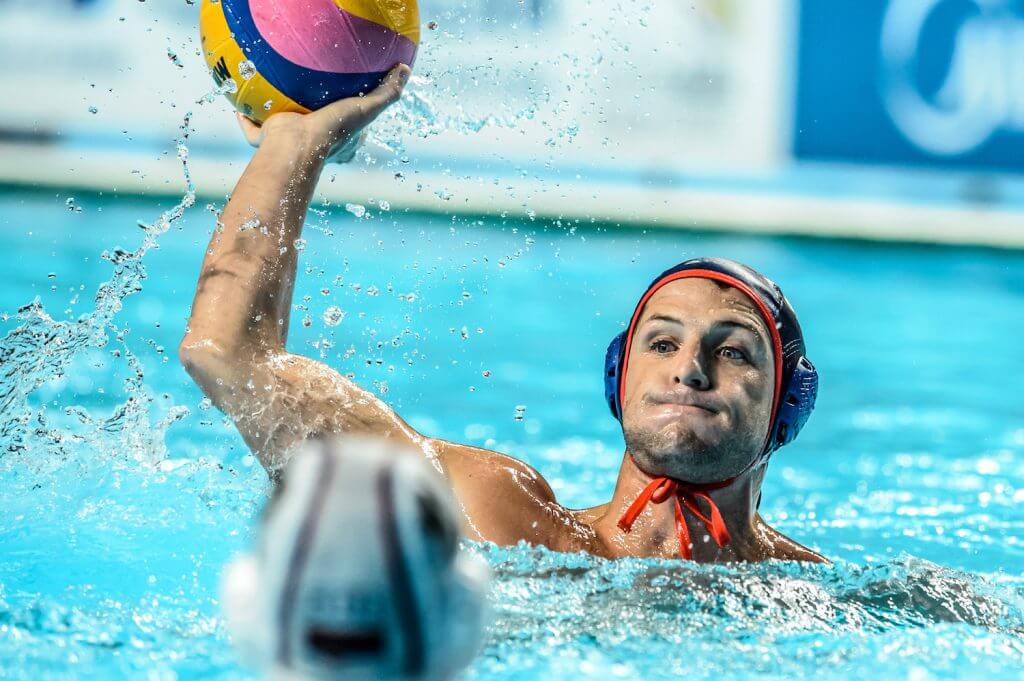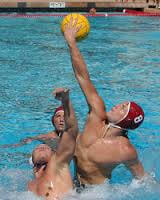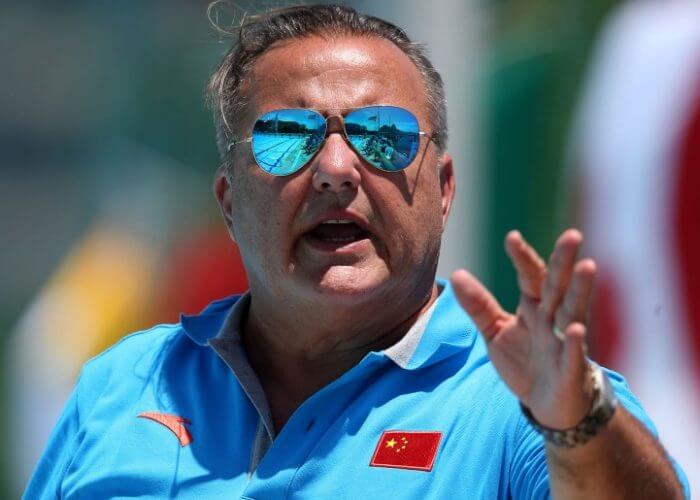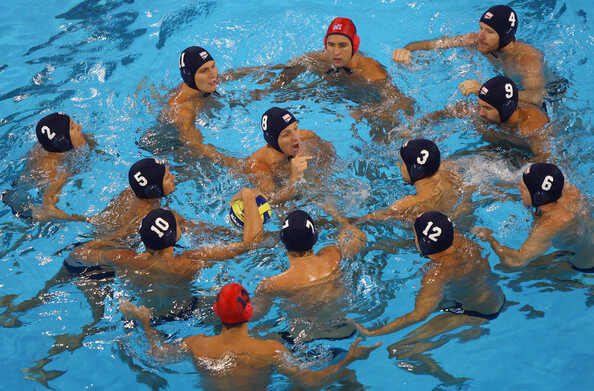Catching Up With Water Polo Olympian Tony Azevedo

by Michael Randazzo, Swimming World Contributor.
By many measures the greatest player in American water polo history, last summer at the Rio Olympics Tony Azevedo joined an exclusive club — only eight other water polo athletes have competed in five or more Olympics (2000, 2004, 2008, 2012 and 2016). With 70 goals in Olympic play, a silver medal in 2008 and the all-time scoring record at the FINA World Championships, the Brazilian-born Azevedo missed out on on a single goal: helping bring Team USA a gold medal.
Announcing his retirement last February, Azevedo’s accomplishments include two NCAA championships at Stanford University (2001, 2002), an unprecedented four Peter J. Cutino Awards (given to the nation’s top college player) and an international career spanning more than a decade.
Swimming World spoke with Azevedo about his playing career, his plans for the future, what it means to be Tony Azevedo, and his thoughts about the upcoming NCAA Women’s Water Polo Tournament.
You had a fantastic career at Stanford and then went on to play for Team USA and professionally. Talk about your two decades playing polo at the sport’s highest levels.
I got the opportunity to ball boy in the ’96 Olympics. There I met Manuel Estiarte, the only water polo player who went to six Olympics. That inspired me to set goals to be the person I am today.
High school was amazing but it was always a stepping stone. I had the dream of winning a gold medal at the very top of my list. But I had so many little goals that I had to focus on immediately that would not allow me to lose sight [of the big picture].
Winning my first championship was great. Being the co-MVP my sophomore year in high school, that was a special moment, but when John Vargas from the national team invited me to be a part of [Team USA], that’s when I knew. And that’s when I set a list of 10 players who I thought were in front of me. Every day in every practice I did everything I could to beat that player in front of me. And then I’d check him off. Then come the next day and I’d check that guy off.
I remember one of the low points in my career was going to FINA Cup before the 2000 Olympics and having one of the worst games of my life. I was accustomed to being a scorer, that’s what I did in my career, and all of the sudden I had other roles for the national team.
If I didn’t score right away I’d get mental. I thought for sure I wasn’t going to make that team, but I had a lot of long talks with Monte Nitzkowski [legendary swimmer and water polo coach]. Mentally I realized that I could do so much more for the team than just score.
I believe that moment really made me who I am because what matters is making the team the best that it can be. What I do personally really doesn’t matter in a team sport. You can be a star but unless your team gets to the top, no one’s going to remember who you are.
That first championship at Stanford with some of my best friends and then winning it my first two years was a dream.
You accomplished what no one ever has—and likely never will again: win FOUR Cutino awards. Will there ever be another Tony Azevedo?

Azevedo at Stanford
I looked up to Pete Cutino so much, and having the opportunity to win not one but all four, and to have no one else win three… that’s something I’ll always be humbled about.
There will never be another Tony Azevedo because that’s my name and that’s who I am. There’s the aspect that I want to be the only one to ever do that, but is that good for the sport? No. I want our sport to grow and I want it to include the biggest and best players out there.
I believe there will be another four- or five-time Olympian. It’s going to take a while because we need to start investing more in the youth. I played in an era where I was lucky; I had a father who was my idol. He taught me from when I was eight years-old. And I traveled all over the world watching the sport.
John Vargas and Nitzkowski—among the top five greatest coaches in United States history—became my coaches at [age] 16. I went from them to Dante Dettamanti at Stanford to Ratko Rudic, who’s considered the greatest coach in the world. Through all these coaches, the fact that I was so motivated at a young age, because I was exposed to what you could be as a water polo player, there was no stopping me.
I hope that there’s a future me; I just think the focus needs to be on our future generations.
What is it that separates the kids that make the national team from everyone else?
What really separates the great is that competitiveness, an attitude that: “I’m going to be the best; I’m going to do whatever it takes.”
It’s also watching the game. There wasn’t a college game near me that I wasn’t watching. There wasn’t a high school team that when our team played I would stay and watch all those games. I was going around to all the best coaches and taking part in these camps because I wanted to play the sport. I didn’t need months off.
Of course I had time for my family and friends but if you have a dream, there’s nothing that should stop you from doing that. And I knew I could be the best.
What separates a lot of players is that intelligence, that knowledge of the game. That ability to not respond but to react. Great players never have to think about what they’re going to do. It just comes naturally to them.
It takes a lot of water polo in order to do that.
You see the the sport from a rarefied perspective: not only being a great player but the connection to accomplished coaches, including your father Ricardo. What’s the best formula for water polo success in this country?

Ricardo Azevedo
If you’re dreaming of being an NBA player and you fall short you’re probably still played for a good D1 school and you have connections. If your dream is to be a doctor and you fail, at least you went to a lot of schooling and will be successful in the next thing you do.
We have to create idols for these kids. You want them to say: “I want to be Tony Azevedo.” Maybe they don’t become a five-time Olympian but if they fall just a little bit short but still go to a top school and play in the Olympics, to me that would be very successful.
We may get more players but we’re still not going to win more medals. Players are still going to stop after college because there’s nowhere for them to make money.
My goal is to do things that have never been done [in water polo]. I’m copying things from the NFL, the NBA, major league tennis. I want to show the kids and the people in water polo that there’s a totally different way that we can approach this to make it more popular and to give our kids a future in this sport.
Our sport is based on so many clubs but really kids outside of California they need more of an individual assessment. They need to know where they are compared to everyone else in the country and they need to be able to measure some kind of progress.
Things that we’re doing now, creating this NFL combine-like database for kids around the world so they can see themselves as compared to the [world’s] best, these are things that will raise the bar for our sport.
What about your new venture, the Aquatic Games, which will be held August 2-6 in Long Beach, CA?
The Aquatic Games is something that I started this year to be the most inspiring thing for these kids. Not only is it a water polo tournament with teams from around the world, but in the morning they’ll get presentations for LA 2024, they’ll see the Olympic torch from 1984, there will be nutritionists. In the afternoon there’s going to be coach talks for Q&A and then it will go on to live music in a carnival environment.
I’m going to bring back the 2-point rule, to experiment with this at these different games and clinics that I do.
I want these kids to be in awe. An opening ceremony on the water in Long Beach. I want these kids to leave being inspired because they took pictures with the 10 Olympians who were there. Eventually [I want to] grow this into all aquatics sports because there’s something that’s lacking in all of them. Next year I’d like to incorporate swimming and eventually kite surfing and others sports.
Participants could come in a swimmers and come out water polo players?!
Absolutely. Between a lot of sports there’s this [attitude]: “Only swim.” “Only water polo.” “Only basketball.” It’s so important to interact with people from around the world, especially at a young age. To see what other sports have to offer, to play, to have fun but at the same time to be inspired and to work.
Maybe it’s not your sport; maybe that other sport inspired you to be who you are. We’d like to house everyone in an Olympic-type village—these kind of things that don’t really exist for kids at a young age who weren’t chosen as the 10 or 15 best in their country.
I was mentored through my father and other coaches and I really want to give these kids these same opportunities.
I’ll work with Cardinal Education, tutoring experts in Palo Alto. I want to offer kids the same mentoring opportunities I had.
Then after that—which I’m sure you spoke with Dragan [Jovanovic] about—is a professional league. At the Aquatic Games a Mexican and a Canadian team are signed up.
We’re the hardest sport in the world for a reason. You can’t just jump in and let your talent take over. You have to work. That’s what’s great about it, because the people who end up succeeding at this sport, they’re the ones who go on to be successful in everything they do. They know how to work hard and they know what teamwork and dedication means. That’s why I’m a water polo player for life and I love it.

Photo Courtesy: Adam Pretty
As you look back on your career, what has stood out between the choices you’ve made and the challenges you’ve faced?
People ask me all the time—because I was named seventh-best athlete in the world a decade ago and they say I’m the best in the sport in U.S. history—imagine if that was another sport like basketball. What if you were Kobe? What if you were Jordan?
I always say the same thing: “I’m not.” I will never ever regret any decision I’ve made. I made them because I love this sport.
I consider myself so much luckier than most people. I don’t just love water polo; it’s in my blood!
How many people can say that for the last 20 years they’ve made a living doing their favorite thing in the entire world.
Now as I look back on this I realize: “I can’t play anymore. What’s gonna happen now?” And that’s where you start thinking: “Do I take that job?!”
Absolutely not. If you’re not that passionate in it, then yes, go to your job right after college. The truth is if you’re hiring, you’re going to want someone who’s that dedicated that much time to go to one Olympics. Imagine someone who went to 2, 3 and so forth! That means that person knows what it takes to succeed in the business world.
Are the days of Tony Azevado playing water polo truly ended?!
My last game will be against Croatia at Stanford on June 11th. I will go out at the college where I won my Cutino Awards and NCAA championships and thank the fans as I walk away from playing forever. No master, no leagues, no nothing. That will be the last time I ever play the sport of water polo not for fun.
Stanford’s women’s team is the #2 seed in the upcoming NCAA Women’s Water Polo Tournament. How do you like the Cardinal’s chances against top seed UCLA?
That’s tough. Brandon [Brooks, UCLA coach]—who was our goalie for two Olympic games [2004, 2008]. I watched the UCLA girls play a couple of weeks ago and they are tough. Rachel Fattal is a stud and so is [Maddie Musselman]. I really love how competitive the UCLA girls are.
I think Stanford’s tough, USC’s tough; it’s gonna be a great NCAA championship.
I’m a fan of Maggie and the way she plays. I’m going to throw all the pressure on her.



